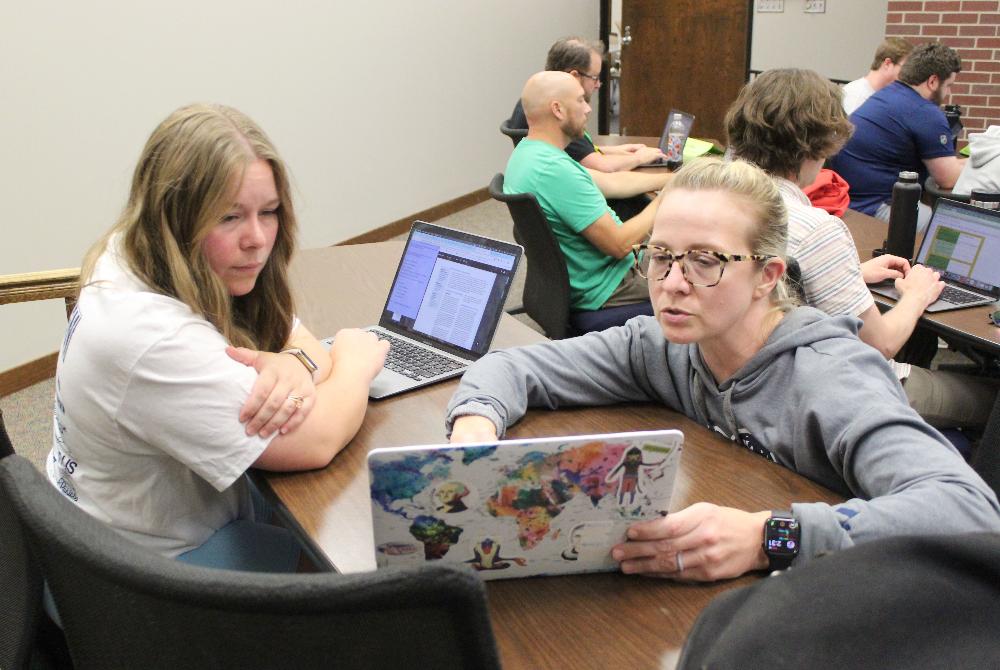LPS teachers build student success through PROMISES grant program
August 14, 2024
Lincoln Public Schools educators will have more instruments in their teaching toolboxes this year thanks to a special graduate-level program at Nebraska Wesleyan University.
Sixty social studies teachers at LPS middle and high schools sharpened their academic carpentry skills in PROMISES grant classes. PROMISES – “Providing Rigor and Opportunity: Meaningful Instruction for Success for Every Student” – is a federally-funded program from the U.S. Department of Education. The first section of the 18-credit-hour program took place at NWU’s Callen Conference Center over the summer.
Lindsay Pierce is the chairperson of Northwest High School’s social studies department and will be starting her tenth year at LPS. She felt the PROMISES classes would help hundreds of students across the school district this year.
“Our biggest goal with everything we do is doing what’s best for kids,” Pierce said. “Adding more rigor in our classes is going to increase the opportunities for success for our kids, because it’s going to push them and help them become better students.”
Ben Czapla and Chris Turley shared Pierce’s enthusiasm about the course. Czapla teaches U.S. history to eighth graders at Park Middle School, and Turley leads Advanced Placement (AP) Human Geography and Civics classes at Lincoln High School. They said the lessons everyone was learning would travel far beyond the walls of social studies classrooms.
“I think adding rigor in one content area helps add rigor in other content areas,” Turley said. “If kids have tools like knowing how to take notes or knowing how to study in one subject, it’s going to help them in other subjects too, so I think it can really be a districtwide initiative. This is allowing students to reach the goals that we’ve set as a district.”

“All of us have different perspectives, which is great because it gives everyone different teaching practices that can be applied to any class,” Czapla said. “Even though we’re specifically social studies in this class, I think what we’re learning here can be transferred into AVID classes, math classes, English classes. I think that’s pretty neat.”
Kevin Bower teaches history courses at Nebraska Wesleyan University and was one of four co-leaders of the opening section. LPS K-12 Social Studies Curriculum Specialist Jaci Kellison, PROMISES Project Coordinator Kevin Rippe and LPS K-12 Social Studies Teacher Leader Pat O’Meara also gave valuable insights about the education profession.
Bower said he was pleased with what he saw from LPS teachers during their time together.
“We had an inspiring week,” Bower said. “Bringing high-level professionals who are committed to the common goal of serving all students into one place and letting them share their experiences, collaborate and learn from leading research on student learning creates something special.”
Bower, Kellison, Rippe and O’Meara carved out a large amount of class time for LPS teachers to make professional connections with each other. Teachers soaked up many different concepts and strategies in large-group settings, and they then brainstormed with each other about ways to construct strong lessons in their classrooms.
“We’ve gained a lot of different resources, which has been really good, and being able to talk to the other teachers who are in here that are all experts at their own things has been great,” Turley said. “We’re able to combine what we’re all good at and provide more resources and different tools and strategies to help kids grow.”
“The coolest thing about this opportunity is teachers coming together and saying, ‘This works in my classroom, what works in yours?’” Czapla said. “And then we’re able to collaborate together to find the best practices to increase that rigor and increase those opportunities for students.”
“One of the things I believe all teachers realize is that we are better together,” Bower said. “Collaboration between school buildings and between grade levels is essential to ensuring that every student in every classroom receives the best possible learning experience.”
The graduate-level courses are just one way LPS students and teachers will benefit from the $1.9 million grant. The PROMISES program will pay all exam fees for students who choose to take AP tests in several social studies courses. The first free AP exams and test preparation workshops took place this past spring at Nebraska Wesleyan.
PROMISES leaders and LPS teachers also believe that the different initiatives will increase future enrollment in honors courses, which is one of the goals of student wellbeing and outcomes of the LPS 2024-2029 Strategic Plan. Forty-eight percent of LPS secondary students completed an honors course during the 2023-24 school year.
“To get to collaborate with other educators to push kids to places that they might not have even thought they can reach is really inspiring to me,” Czapla said. “Getting seventh and eighth graders into those AP classes and then succeeding in those AP classes once they get into high school is a big goal.”
Bower said the academic carpentry sessions showed how much LPS teachers are willing to invest to expand their classroom toolboxes.
“I do not know if people outside of the world of education always realize how much time teachers devote to professional learning when school is not in session,” Bower said. “So, we are happy that the PROMISES project can provide additional opportunities for that in conjunction with the collaborative opportunities that already exist across the school district and within school buildings.”
To learn more about the PROMISES project, visit our website at https://home.lps.org/socialstudies/promises-project/.
Do you have a story idea? Share it with the LPS Communications Team by filling out this form!
Published: August 14, 2024, Updated: August 14, 2024

Lincoln Public Schools social studies teachers share insights with each other this summer during a PROMISES grant class at Nebraska Wesleyan University. PROMISES is a federally-funded program from the U.S. Department of Education. The goal is to help teachers add rigor and opportunity for students in all of their social studies courses.
